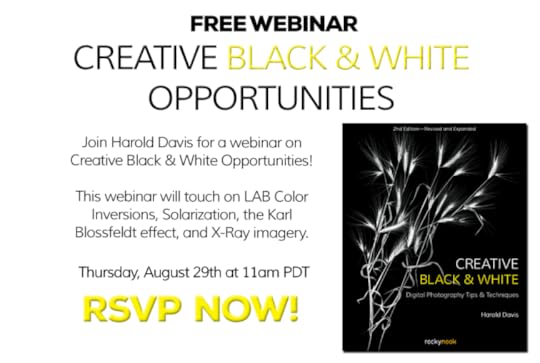Harold Davis's Blog, page 64
August 25, 2019
Bailey Island, Maine
Like a narrow finger, Bailey Island extends into Casco Bay on the Atlantic coast of Maine. It’s connected to the mainland, some thirty miles away, via a narrow bridge of unusual construction to Orr Island, which serves to intermediate between Bailey Island and the outskirts of Brunswick, Maine.
Built in 1928, a Historic Civil Engineering Landmark, this “cribstone” bridge is a lattice of granite stones held in place by gravity. The stone slabs, longer than they are wide, are laid horizontally, first lengthwise, and then crosswise, in several layers, so the load-bearing construction of the bridge is essentially woven of stone.
No mortar or cement is used. The granite slabs are heavy enough to withstand the forces of wind and waves, while the open cribbing allows the tide to ebb and flow freely through the bridge supports.

Bailey Island Bridge © Harold Davis
On Bailey Island itself, Giant’s Stair is notable as an impressive rock formation facing eastern Casco Bay. The land around the Giant’s Stair was donated as a park by a Bailey Island sea captain; the area stands as lonely sentinel to the forces of wind, wave, and geology as they are encroached upon by summer homes of Portland folk.
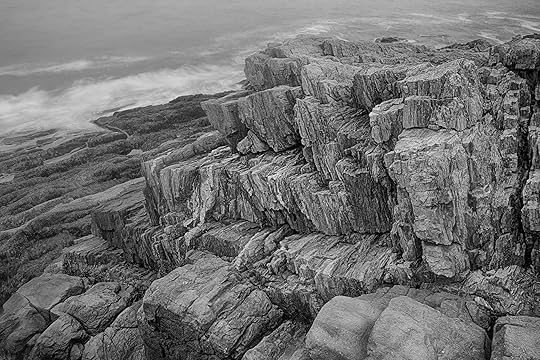
Giant’s Stairs © Harold Davis
The thing to eat on Bailey Island is, of course, lobster—and the working harbor holds snugly fishing trawlers, lobster-men, and pleasure craft. On the rise behind the harbor, second homes dot the vista, adding a contrast between the processing wharf shown in the lower left of my photo of the Bailey Island Harbor, and the presumably haute bourgeois lifestyle of the summer residents living in the homes on the upper right.

Bailey Island Harbor, Maine © Harold Davis
Coming down to a boatyard, I enjoyed photographing abstractions the hulls of boats out for maintenance. This one looks like a far country itself, with depth and delineation in the lines of the craft.
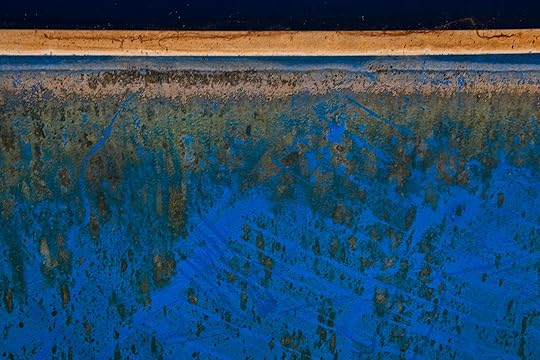
Hull Down © Harold Davis

August 24, 2019
Clematis that Remains
This spiral structure is what remains when you don’t deadhead a Clematis flower, and leave it on the vine. You can see how the core of the flower has expanded into the spiral, and the petals have dropped away. The view below is from the underneath, or back; the front view, the top of what used to be the flower, is shown here.
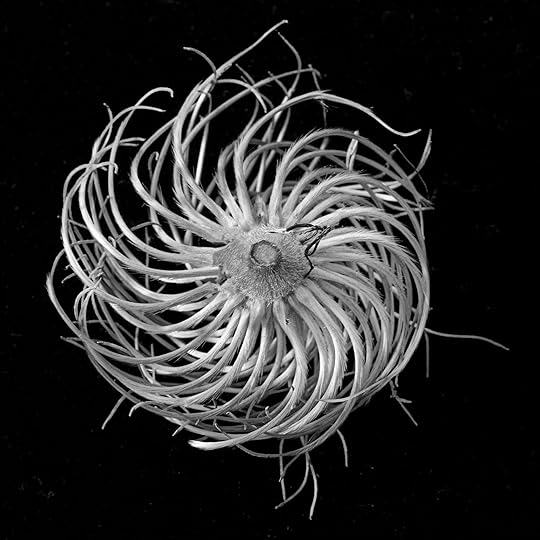
Clematis © Harold Davis

August 20, 2019
Free Webinar: Creative Black and White Opportunities
Please join me for a free webinar about Black and White creative opportunities. The webinar is scheduled for Tuesday August 29 at 11AM PT, with free registration on a first-come-first-served basis. Click here to register for my webinar, which is sponsored by Rocky Nook, the publishers of my new book.
In this webinar, I will discuss tips and tricks related to digital black and white photography, and will include material on LAB inversions, solarization techniques, the Karl Blossfeldt effect, and x-ray imaging.
My new book, Creative Black & White, 2nd Edition, is now available. The publisher, Rocky Nook, is offering a 40% discount. Click here to buy Creative Black & White 2nd Ed directly from the publisher. Use the code “HDAVIS40” [no quotes] at checkout to apply the discount (you can also use my discount code for all other Rocky Nook books, by the way!).
Here are the links for my book on Amazon.com and on B&N as well, so the choice of supplier is yours.
Click here to register for my webinar, which is sponsored by Rocky Nook, the publishers of my new book.

August 16, 2019
Class Demo
At the end of the Garden Photography workshop this past week, I quickly arranged some flowers on an LED panel to demonstrate my Photographing Flowers for Transparency technique. This LED panel was the closest thing to a light box we could find, and was originally purposed as lighting, rather than a photographic surface. Which goes to show, improvisation is often crucial to artistic endeavors.

Class Demo © Harold Davis

Eye Dahlia
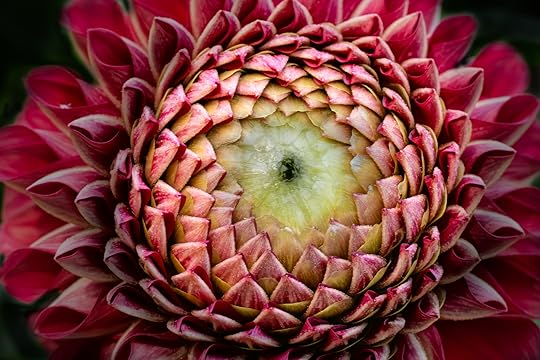
Eye Dahlia © Harold Davis
Sometimes individual flowers call out to me as so unique that I need to photograph them on their own. This rather small dahlia, photographed at the Endless Summer Dahlia Farm, made me think it I had an eye with a pupil in the center. I used my 50mm Zeiss macro with a 24mm extension tube, both on my tripod, to get close while rendering the detail well.

August 15, 2019
Garden Gate

Entering the Enchanted Garden © Harold Davis
Gardens are about more than flowers. An important component of any garden is how you get in, or if you get in at all. Gardens have entrances and exits, and, yes, gates. The garden gate helps signify the kind of garden you should expect: formal versus informal, exclusive versus inclusive, playful versus serious, and so on.
What does the garden entrance shown here, to the Abby Aldrich Rockefeller garden, with the garden’s Spirit Path shown through the gate, suggest about the character of this lovely garden?

Garden Gate © Harold Davis
Top photo using a circular fisheye is intentionally overexposed to suggest an enchanted garden within; bottom photo (shown immediately above) is a panoramic crop of a horizontal fisheye indicating the extent of the wall surrounding the garden.

August 13, 2019
It Be a Bee then Froggie and Me
The real denizens of any garden are the animals and insects. We humans are just visiting and passing through.
I found the frog, or the frog found me, in the Abby Aldrich Rockefeller Garden; the bee was happily mining for nectar in the Coastal Maine Botanical Gardens.

Froggie and Me © Harold Davis

Bee Mine © Harold Davis

August 12, 2019
Endless Summer Dahlia Farm
The Endless Summer Dahlia Farm, in Rockport, Maine, is an incredible place run by nice folks with very exceptional dahlias. Here are a few, photographed the other day.
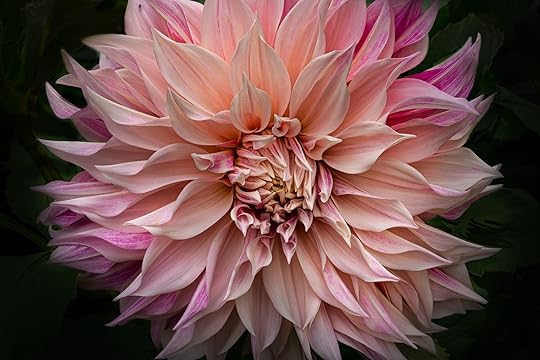
Dahlia at the Endless Summer Farm © Harold Davis

Orange Dahlia © Harold Davis

August 11, 2019
Finding the Attic
Phyllis just reminded me via Facetime that Maine is “Stephen King” country. So it was with a certain amount of trepidation that I opened a door I had never noticed before (or always thought of as a locked closet) in the house the workshop organization is putting me up in. The door led to a rickety flight of stairs and an attic with many needful things, and the dormer window you see here.

Attic (via IPhone) © Harold Davis
The photograph above is via iPhone, processed in Snapseed and ImageBlender. The photo below is monochromatic HDR processed in Photoshop, and captured with my D850 and a 15mm horizontal fisheye on a tripod.

Attic Monochrome © Harold Davis

August 9, 2019
Celebrating LAB Color

Pale Garden on Black © Harold Davis
I’m really pleased with a comment in my Instagram feed about my Creative LAB Color in Photoshop course: “I am currently taking your LAB editing course on LinkedIn. And I cannot say enough good things about it! It is so awesome that you shared those techniques with the rest of us so we can at least try to produce some of the gorgeous output you produce! Thanks so much for sharing your knowledge.”
No, thank you (you know who you are): for taking the time to give me such wonderful feedback.
If you are interested in a unique (this is information about techniques that I have developed, and cannot be found anywhere else), hands-on (all images that are shown are available as low-resolution teaching files), complete, step-by-step guide to working creatively with LAB in Photoshop, please check it out!
I’m off to mid-coast Maine today to teach my garden photography course, and am looking forward to flowers (photographing, that is) and lobsters (yes, eating!)…you never know, of course: I might mix and match.
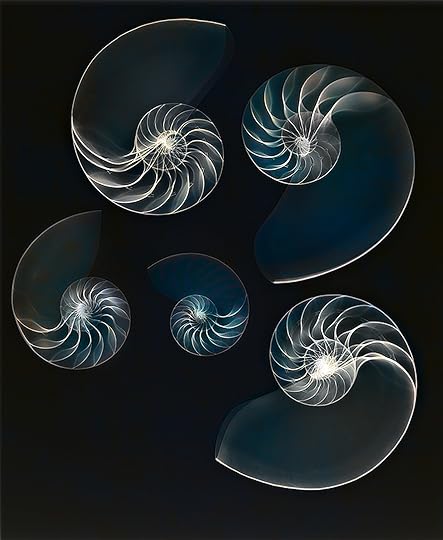
Nautilus Shells LAB © Harold Davis


